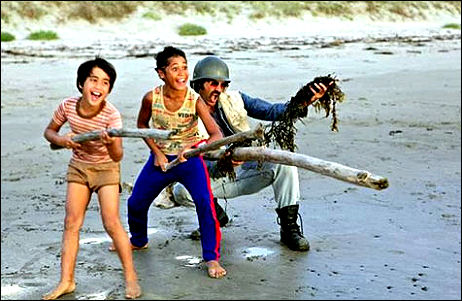I regret to say that John Wells‘ Company Men, a drama of layoffs and despondency affecting three Boston-area white-collar guys (Ben Affleck, Tommy Lee Jones, Chris Cooper), plays like an intelligent funeral in a nicely furnished minimum-security prison.
It’s an honest and competently assembled attempt to capture the Great Recession lamentations of the moment, but the story just kind of plods along. It feels lifeless and confined — stuck with itself with no escape plan. It’s kind of proud, in fact, of being a story about well-dressed prisoners and their wives and children. Each dawn I die.
Wells was obviously convinced that just telling these three stories in a plain, no-frills, reality-reflecting way would suffice. Over and over Company Men says that losing one’s job can be devastating on several levels, that unemployment requires lifestyle cutbacks, that older men need sometimes need the jolt of an affair to feel alive, that job-seekers frequently fall into denial and despair, and that this country’s inability to compete in the honest making of things amounts to a huge spiritual deficit.
Yeah — agreed, agreed. But I kind of knew or suspected all of this. And yet the movie confines itself in an upper middle-class ghetto that feels — I’m going to steal a line from Camille Paglia — so lacking in “the lurid pagan truth about life.”
There’s no madness, no sexual intrigue to speak of, no wily characters, no humor, no violence, no fist fights, and no Sopranos-style aplomb in portraying the grim or ironic undercurrent of things among suburbanites with power and money, etc.
Company Men is obviously occupying a portion of the same turf as Up In The Air minus the Clooney-and-Farmiga charm, the emotional resonance, the air miles, the sharp dialogue and the smartly angled characters.
Kevin Costner has a smallish role in Company Men as the house-renovating brother of Affleck’s wife, played by Rosemary DeWitt. He doesn’t have very many lines, but I wish the story had been mostly about him because he’s easily the most appealing personality on the boat. The second most engaging performance is given by Craig T. Nelson as the blunt-spoken CEO of the company whose cost-trimming decisions cause all the grief.
I’m genuinely sorry to have said most of this. A team of smart, sophisticated and well-intentioned people made Company Men , but it’s an absolute stiff in terms of real-world theatrical potential. I could see watching Company Men on HBO on a Sunday evening and going “yeah, not half bad,” but I wouldn’t dream of recommending it as a movie to go out and pay $12 bucks to see plus parking and popcorn.

